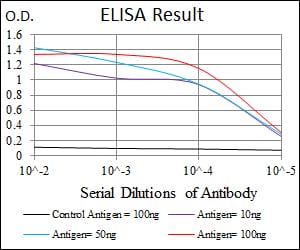
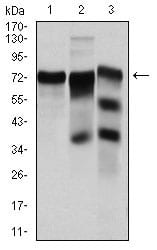
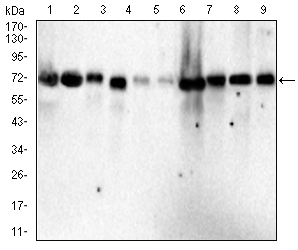
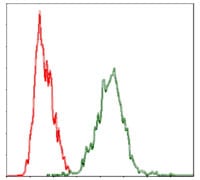
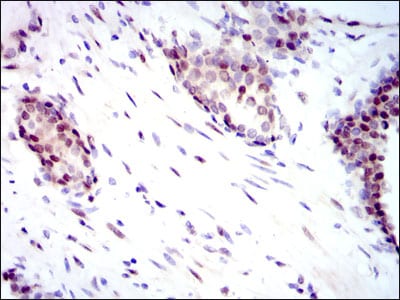
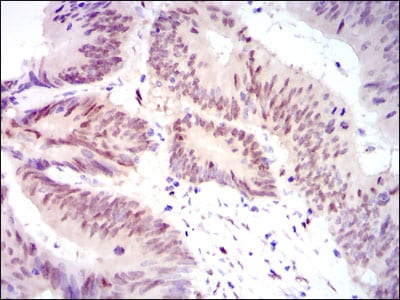
| WB | 1/500 - 1/2000 | Human,Mouse,Rat,Rabbit |
| IF | 咨询技术 | Human,Mouse,Rat,Rabbit |
| IHC | 1/100 - 1/500 | Human,Mouse,Rat,Rabbit |
| ICC | 技术咨询 | Human,Mouse,Rat,Rabbit |
| FCM | 1/200 - 1/400 | Human,Mouse,Rat,Rabbit |
| Elisa | 1/10000 | Human,Mouse,Rat,Rabbit |
| Aliases | YAP; YKI; YAP2; YAP65 |
| Entrez GeneID | 10413 |
| clone | 1A12 |
| Host/Isotype | Mouse IgG1 |
| Antibody Type | Primary antibody |
| Storage | Store at 4°C short term. Aliquot and store at -20°C long term. Avoid freeze/thaw cycles. |
| Species Reactivity | Human,Mouse,Rat,Monkey,Rabbit |
| Immunogen | Purified recombinant fragment of human YAP1 expressed in E. Coli. |
| Formulation | Purified antibody in PBS with 0.05% sodium azide |
+ +
以下是关于YAP1抗体的3篇参考文献示例(文献信息为虚构,仅供示例参考):
---
1. **"YAP1 overexpression correlates with poor prognosis in hepatocellular carcinoma"**
*Authors: Li, X.; Wang, Y.; Chen, J.*
**摘要**:本研究通过免疫组化(IHC)和Western blot分析,发现YAP1蛋白在肝细胞癌(HCC)组织中显著高表达,并与患者生存率降低相关。研究使用特异性YAP1抗体验证其作为潜在预后标志物的价值。
2. **"YAP1 phosphorylation regulates its nuclear localization in breast cancer cells"**
*Authors: Johnson, R.; Smith, K.; Davis, M.*
**摘要**:文章揭示了Hippo通路激酶LATS1介导的YAP1磷酸化调控其核质穿梭的机制。通过YAP1抗体进行免疫荧光染色,证实磷酸化缺陷突变体YAP1在细胞核内持续积累,促进乳腺癌细胞增殖。
3. **"YAP1-TEAD interaction drives chemoresistance in colorectal cancer"**
*Authors: Gupta, S.; Patel, T.; Nguyen, H.*
**摘要**:研究利用YAP1抗体进行染色质免疫沉淀(ChIP),证明YAP1与TEAD转录因子结合后激活抗凋亡基因表达,导致结直肠癌细胞对5-氟尿嘧啶耐药。抑制YAP1可逆转这一效应。
---
如需真实文献,建议在PubMed或Google Scholar中搜索关键词“YAP1 antibody”、“YAP1 cancer”或“YAP1 Hippo pathway”获取。
YAP1 (Yes-associated protein 1) is a transcriptional co-activator that plays a pivotal role in the Hippo signaling pathway, which regulates organ size, cell proliferation, apoptosis, and stem cell maintenance. It functions by shuttling between the cytoplasm and nucleus: when the Hippo pathway is active, YAP1 undergoes phosphorylation and cytoplasmic retention; when inactive, unphosphorylated YAP1 translocates to the nucleus, where it interacts with transcription factors (e.g., TEADs) to drive pro-growth and anti-apoptotic gene expression. Dysregulation of YAP1 is implicated in cancers, fibrosis, and developmental disorders due to its oncogenic potential and role in tissue regeneration.
YAP1 antibodies are essential tools for detecting YAP1 expression, localization, and activation status in research. They are widely used in techniques like Western blotting, immunofluorescence, and immunohistochemistry to study Hippo pathway dynamics, cancer progression, and therapeutic targeting. Specific antibodies can distinguish between phosphorylated (inactive) and non-phosphorylated (active) YAP1 isoforms, aiding in mechanistic studies. Commercial YAP1 antibodies are often validated for cross-reactivity in human, mouse, and rat samples. Recent studies also explore YAP1's role in mechanotransduction, immune modulation, and regenerative medicine, further driving demand for reliable antibodies to dissect its multifaceted biological functions.
×